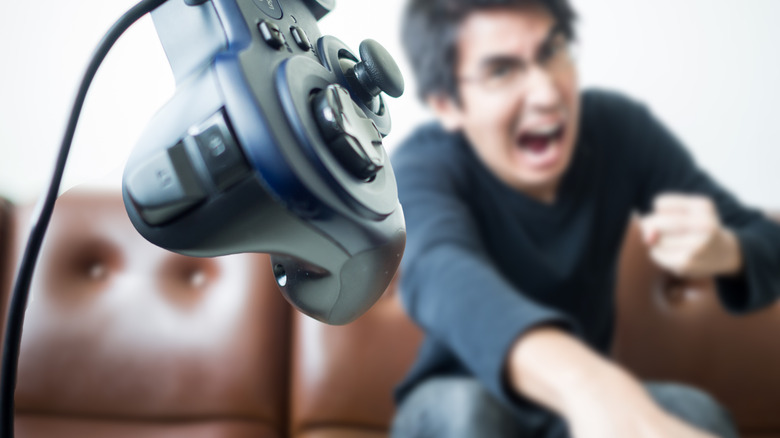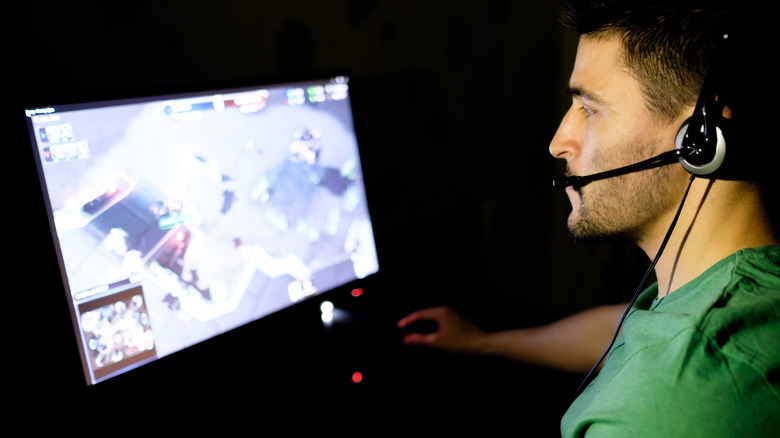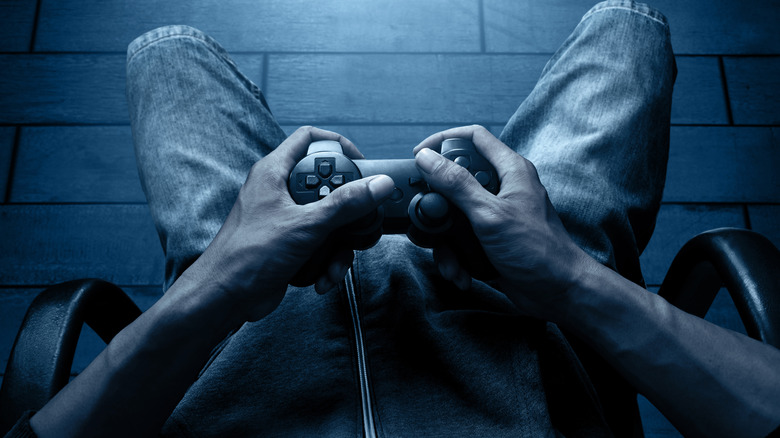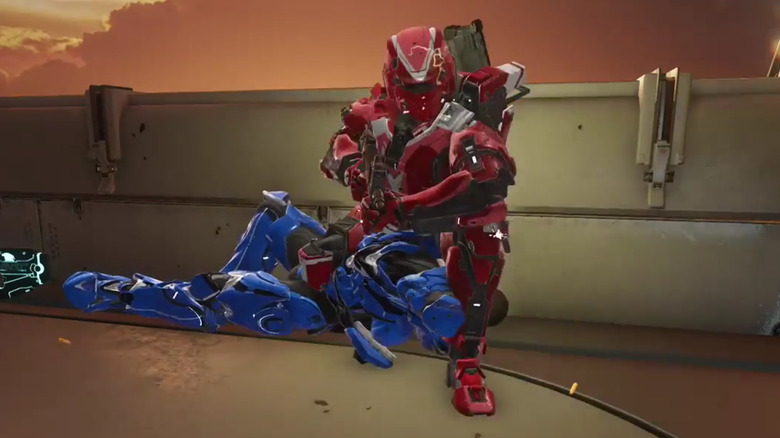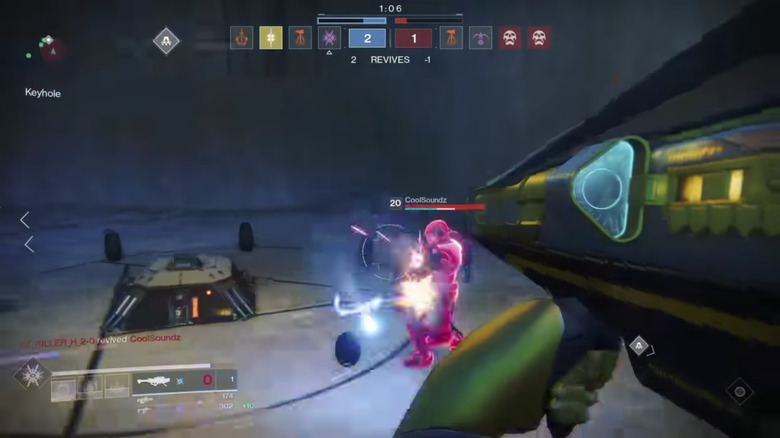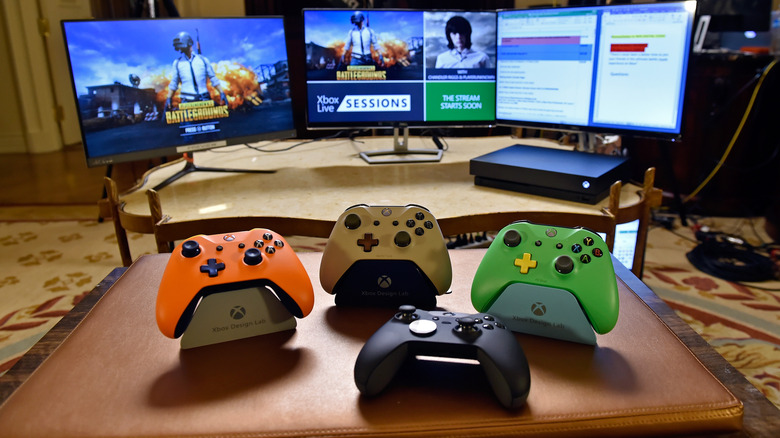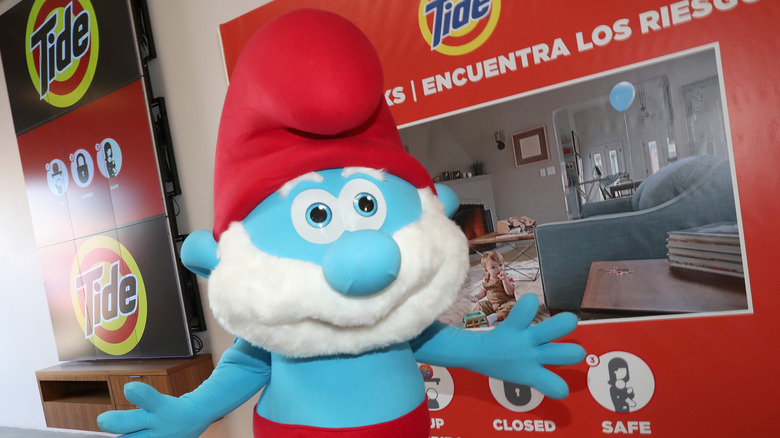Signs That You've Become A Toxic Gamer
Imagine coming home from a long, hard day at work. You kick off your shoes, put your feet up, and boot up your video game platform of choice for a few rounds of your favorite title. And instead of getting the escapism you've been craving all day, you get a teammate who starts purposefully killing you. Or a string of angry messages after a match. Or a game against someone who is clearly using an in-game exploit to cheat.
Rather than feel relaxed, you feel frustrated, and your mood has soured thanks to the experience you've just had. All thanks to toxic gamers.
Now ask yourself this question: do you partake in any of the above examples to ruin someone else's time playing games? Do you find satisfaction in being a video game troll? Continue reading on and we'll go more in depth on some of the ways toxic gamers negatively affect the way others play games. If you find you regularly act in ways that aren't all that upstanding, guess what? You might be a toxic gamer.
You talk down to your teammates
There are a lot of gamers who look back fondly on the birth of Xbox Live, when online multiplayer and voice chat came to console gaming. One article in particular reminisces about playing Rainbow Six: Vegas on the Xbox 360 years later, when "nearly everyone used a headset." Fast forward to the present day, however, and you'll find plenty of forum posts lamenting the fact that a lot of people don't chat in games anymore.
Why? Voice chat has become toxic. And people who talk down to their teammates are a big part of the problem.
One of the games where this is most prominent is Overwatch. When playing, there's a fairly good chance that if you happen upon teammates who are using a microphone, they're going to get on your case for the character you choose, your play style, or both. What inevitably happens is this: those who simply want to play and have fun will mute chat and opt out of using a headset altogether. After all, if you just wanted to kick back and play some games, would you want someone constantly yelling at you?
Which leads to this plea: if you're one of those people who talks down to teammates, stop it.
It's never your fault
"Cyberbullying offenses are explained by attribution theory in that when a toxic player recognizes a poor performance (e.g., even though the match is not decided, his team is losing) he looks for someone other than himself to place blame."
The above quote isn't pulled from a gaming article, but rather, a research study looking at how exactly cyberbullying rears its ugly head in video games. Toxic multiplayer gamers are often the purveyors of this bullying, because despite being part of a collective team unit, they just can't seem to assign any blame to themselves when a loss occurs.
What drives this behavior? Perhaps it's ego. It's not easy for some gamers to admit when they fall short, and as one gamer put it, it's easier to deflect blame onto teammates because "the nature of team games mean that these people are never forced to confront their [losses] in the way they would be in a 1v1 game." But the truth is, people who put the burden of blame on everyone else just aren't fun to play with. They're toxic, and if this sounds a lot like you, you're part of the problem.
You quit when you're losing
In most video games, quitting isn't that big a deal. In a Madden game, for instance, you're typically playing a one-on-one matchup, and your opponent quitting nets you the win you were probably going to get anyway. Where quitting becomes a problem is in games with many players, where the loss of a teammate or opponent can make the rest of the game — or even getting into a new game — a torturous affair.
In Destiny 2, where most multiplayer modes are 4-vs-4, having a teammate drop out of a game you're losing makes coming back an even bigger uphill climb. It takes a bit of time for the game to replace the departed player, so the team you're facing is free to run up the score with its advantage. Another game that suffers from quitters is Friday the 13th. Everyone wants to play as Jason, but unfortunately, there is only one Jason. This leads to players backing out of games until they can play as the villain, slowing the matchmaking process down for everyone else.
Have some honor. If you start a game, finish it — if not for yourself, then for the other players rounding out your experience.
You send hateful post-match messages
It's one thing to lose a online multiplayer match and be disappointed with yourself. There's no shame in finishing up, logging off, and maybe going for a walk to clear your head. But it's another matter entirely to both lose and decide to harass your opponent after the game ends. And unfortunately, this seems to be a trend that is picking up steam in the online gaming world. Some players, angry about losing, will jump from the post-match screen immediately into their platform's messaging app to compose some hate mail.
Some are able to see the humor in this behavior, with one player saying, "I find it funny someone would take time out of their day to curse me out through a message just because they can't take a loss." But many other gamers — those who hop online for a good, drama-free time — would rather not deal with it.
As one Destiny player on Bungie's forum said, "If you send hate messages after Crucible games ... Please just don't. It's ridiculously childish."
We agree.
You're a griefer
According to the Oxford Dictionary – which does, indeed, have a definition for this — a griefer is "a person who harasses or deliberately provokes other players or members in order to spoil their enjoyment." These are gamers who enter into online play not to accomplish anything substantive, but instead, to get on the nerves of those who have logged on to have fun. If you've ever wound up with a griefer in your game, you're well aware of what these people are out to do.
They're the players in Elite: Dangerous who worked to interfere with the final space voyage of a terminally ill cancer patient. Or invaded the Minecraft server of a nine-year-old kid. When it comes to toxic gamers, griefers are the worst of the worst. If you derive your happiness by making other players miserable, you're one of them. Shame on you.
You file false reports against people who beat you
Being good at a video game is a double-edged sword. With victory comes glory, and seeing your name at the top of the leaderboard after a match can be immensely satisfying. On the other side, however, there's the heat you'll be taking for displaying your skill. Some opponents will even accuse you of cheating. Where this becomes problematic is when these opponents realize they have access to a multiplayer reporting system.
Using an online multiplayer system, such as Xbox Live or PlayStation Network, a disgruntled, defeated opponent can potentially report you for cheating, swearing, or some other inappropriate behavior. And they can do so even if you're totally innocent on all counts. Xbox Live in particular is ripe for abuse on this front, as some games can segregate you from the general player population if you get enough bad reports. This makes it harder for you to matchmake, all because you were better at a video game than someone else.
If you've ever done this yourself, you're only adding to the toxic environment so prevalent in games today. Please stop.
You teabag other players
The sign of a respectful video gamer can be summed up in two short letters: "gg." The acronym is short for "good game," and it's the kind of message someone sends to another player when they appreciate the competitive nature of the match that took place and the skill the other player displayed.
Of course, if you'd rather be entirely disrespectful to your opponent, you don't have to wait until the end of the match to do that. You can simply "teabag" their character's lifeless body.
We won't get into what teabagging means specifically — you're more than welcome to brush up on the full gaming history of the phrase — but the act seems to show up most in first-person shooters. And it's toxic enough that, according to an academic study sourced by Kotaku, most of the 393 gamers surveyed "took pains to distance themselves" from the act.
Teabagging another player can negatively affect their experience with the game. Some people just want to play as a means to escape the stress of daily life. As one writer put it, "When one of my better opponents, or worse, a very lucky lesser opponent, deems my corpse worthy of their ball-bag, it's not just a taunt or them mocking my abilities, it's a moment that breaks the fourth wall of my escape and reminds me that people are dicks, and that there are people in this world who find joy in others' misfortunes."
You cheat
When entering the arena of combat, most do so with the intention of playing by the rules. After all, the best measure of your skill is competition against an opponent who is at their best. And winning fairly also gives those who emerge victorious a sense of pride, and also, the ability to look in the mirror every morning and not feel like a terrible person.
Not all homes have mirrors, apparently, because cheaters do exist. They play games like Destiny, glitching into the walls during high-level multiplayer matches so they can avoid earning gear the hard way. They use "aimbots" in Fortnite so they don't have to work on bettering their aim. Sometimes they even cheat for the glory of holding a world record that others may be more deserving of.
Those who don't enjoy sports, or those who are unable to play, can still get their adrenaline flowing by competing in video games against others. When someone cheats, they not only rob themselves of a pure experience: they ruin the fun for other people, too.
You harass the developers behind the games you play
There's a special kind of toxicity some people reserve when it comes to video games. It has nothing to do with those they're teaming up with or playing against, but rather, the developers who put together the experiences we know and love. It goes well beyond constructive criticism to a far different place: one that more resembles harassment and bullying than simply offering up an opinion. And it's not cool.
We're talking about the type of mobs that gather around a development studio or publisher that makes an unfortunate misstep. For instance, you might remember the controversy surrounding Star Wars: Battlefront II and its inclusion of "pay-to-win" loot. While the decision to offer such loot boxes may have been fair to critique, some fans of the franchise took their anger past that point. The Destiny series of games also has its share of haters online, and Bungie's Twitter account regularly gets replies that say not-so-pleasant things about the game.
Offer your feedback in a helpful way and offer your suggestions, by all means! But don't target the companies and individual developers with hateful comments. They don't help anyone.
You're a fanboy
In your travels on the internet, you've likely come across a "fanboy" in some shape or form. A fanboy is defined as "A male fan who is obsessive about a particular subject (especially, something or someone in popular entertainment media)." And in that more general definition, it doesn't sound so bad.
Where the term gets ugly is when it involves video games, because it takes on an entirely different meaning. In the gaming world, a fanboy is almost like a soldier who's somehow been enlisted by the console they've purchased to go to war. If it's someone who owns an Xbox One, they're die-hard to the point that they believe every other game platform is inferior. And every platform has fanboys, from Xbox fans who call PlayStation owners "Ponies," PlayStation fans who call Xbox owners "Xbots," and the PC Master Race crowd who look down on console gamers as "plebs."
It's all part of a war between gamers in their various factions who feel the need to defend the thing they chose, and none of it is constructive. The truth is, if you write all other platforms off, you're missing a lot of great games. And you're helping further the narrative that gamers are immature.
You boost and smurf
No, we're not talking about protein shakes and little blue people. Both "boosting" and "smurfing" are techniques used by video gamers to manipulate their standing in a multiplayer game. Boosting refers to the act of using a frowned-upon method to gain rank or rewards, such as a friend letting another friend beat them over and over. And smurfing involves creating an alternate account so someone can play (and potentially lose) without affecting their stats, or perhaps, play against others who would otherwise be below their rank.
You can see how the two would be problematic to those who run into a "booster" or "smurfer." Someone boosting in a competitive multiplayer match might wind up with a teammate who isn't trying, but is instead losing on purpose to help a friend. And a player matched up against a smurfer may think they're up against someone at their same level, when in reality, they're playing someone far better.
Both of these tactics are used by toxic gamers. Hopefully you aren't one of them.

